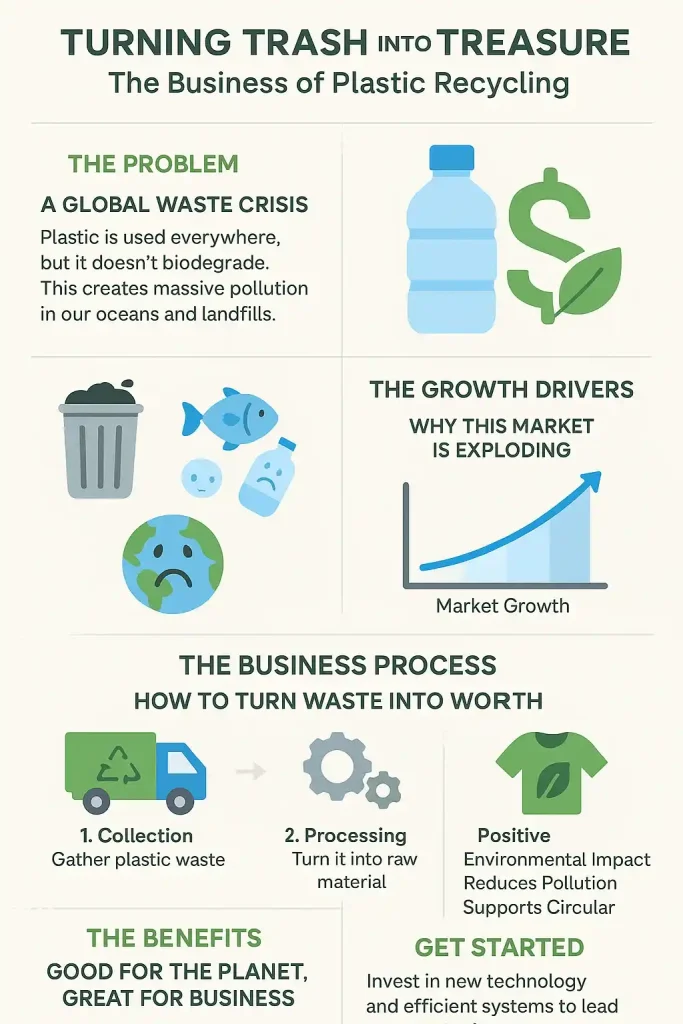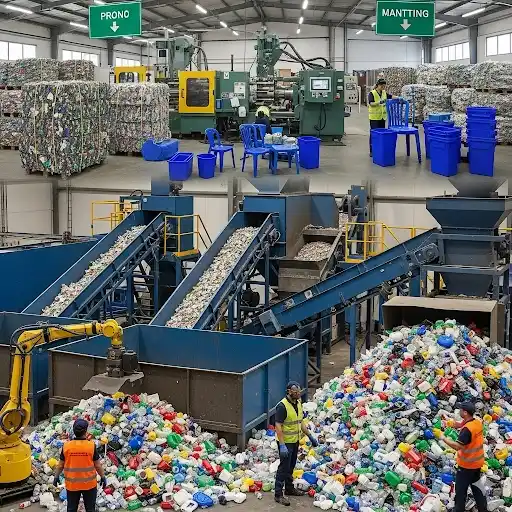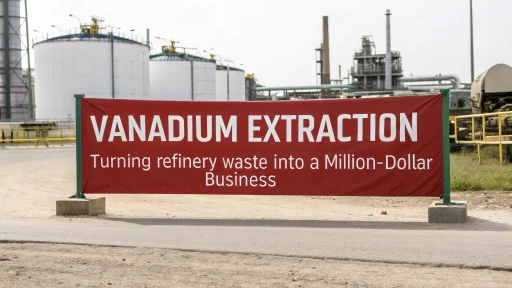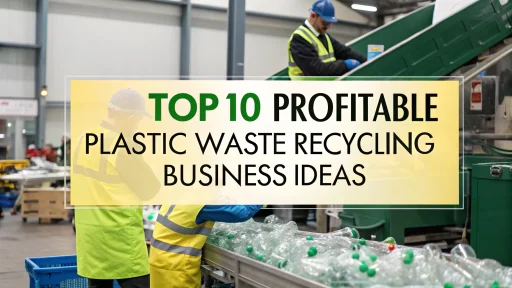Plastic recycling is one of the fastest-growing sectors in sustainability. Governments, corporations and communities invest heavily in recycling systems due to the growing concern over pollution and environmental damage. Plastic is an extremely versatile material that can be used for packaging, automotive, textiles and consumer products.
Its non-biodegradable properties have led to significant waste issues. It has led to a large demand for companies that recycle plastics and can turn waste into recyclable materials. This industry will grow in the coming decade due to strict environmental regulations and increased awareness about circular economy practices.
Entrepreneurs can enter this market with both a strong financial potential and a positive impact on society. This also opens up opportunities for innovation as companies explore new ways to recycle plastics. This sector offers a competitive advantage to those who invest in advanced technology and structured collection systems.
Plastic Recycling Business: Key drivers of the industry
Multiple factors are responsible for the industry’s rapid growth. Many governments around the world have introduced strict waste management legislation that encourages recycling rather than landfill disposal.
Many countries have introduced Extended Producer Responsibility (EPR). It holds manufacturers responsible for the waste they create. Companies are now using recycled plastics for packaging. This reduces their dependency on virgin plastics and supports recycling businesses.
The consumers also play a major role. Demand for recycled materials has increased due to the shift toward environmentally friendly products. As brands market their sustainability credentials, they create a constant demand for recycled materials in packaging, textiles and automotive components.
Technological advancements in sorting, chemical recycling and other processes make it possible to recycle plastics previously thought not recyclable.
Read More: How to Start Recycling Business of Waste Plastics
Plastic Recycling Businesses Face a number of challenges
The industry has a lot of potential but it also faces a number of challenges. Entrepreneurs must overcome these. The lack of efficient systems for waste collection and separation is one of the major obstacles.
Plastic waste is often mixed in with other waste types, which makes it costly and difficult to process. These inefficiencies make it difficult for many recycling plants to obtain high-quality, consistent raw materials.
The cost of setting-up and operating a recycling center is another major concern. Investments in high-capacity machines, advanced sorting devices, and specialized units are required. This can be a barrier for small businesses. A perception problem also exists.
Some industries are hesitant to use recycled plastics because of concerns about quality and durability. Innovations, however, help to overcome this. Businesses must also plan carefully due to the competition in the market, fluctuations in demand and unstable prices for recycled products.
Read More: Profitable Plastic Waste Recycling Plant Business Opportunity
How to start a plastic recycling business
A successful plastic recycling company requires careful planning, and a step by step approach. First, conduct a market study to identify local buyers and understand the demand for recycled products.
Entrepreneurs must decide whether they want to focus on mechanical or chemical recycling. Mechanical recycling involves shredding plastic and turning it into pellets. Chemical recycling breaks plastics down into their components, allowing them to be reused.
Entrepreneurs must then secure funding once their focus has been determined. Investments in recycling businesses include collection vehicles, sorting units, cleaning units and shredders. Registration, licensing, and environmental clearances for your business are all essential.
It is important to choose the right location, which should be near both potential buyers and raw material suppliers (waste). Establishing partnerships with waste pickers or industrial suppliers, municipal waste departments and waste departments can help ensure a constant flow of materials.
Read Our Project Report: Click Here
Marketing plays a key role too. Recycling businesses should emphasize their sustainability and develop relationships with industries such as construction, packaging, and textiles that require recycled plastics. By establishing a reputation for quality and innovation, you can build trust in the market.

Plastic Recycling Business: Best Practices to Success
Businesses that are successful in recycling are those who focus on efficiency and innovative ideas. The quality of recycled goods can be improved by investing in sorting and cleaning technologies. Labeling campaigns and community awareness can help increase waste separation at the source. This will reduce processing costs.
It is important to have a strong supply chain. A steady stream of plastic waste can be ensured by partnering with local communities, municipalities, and private waste management firms.
Diversifying their product offering is another way that many successful recycling companies succeed. They produce pellets, sheets and fibers or even finished goods like furniture and construction material.
Keep up to date with the latest government policies and subsides. Many regions provide tax incentives or financial incentives for companies in the recycling industry. These schemes can be used to offset initial investment and to expand quickly.
Read Our Book: Click Here
The Industry: Opportunities for Growth
Plastic recycling offers many opportunities for growth. Recycled plastic is increasingly popular across industries as global trends shift towards eco-friendly and zero-waste products.
Packaging companies use recycled content more and more to achieve sustainability goals. Manufacturers are also experimenting with composite and biodegradable plastics.
Recycling technology innovations also open up new business opportunities. The chemical recycling industry has a huge potential as it can break down even complex plastics and reuse them. Businesses can explore the possibility of producing products with added value from recycled materials.
These include high-quality fabrics, construction panels or 3D filaments. Digital platforms and supply-chain tracking systems make it easier for buyers to find recyclers, creating an organized marketplace for recycled goods.
Find the Best Idea for Yourself With our Startup Selector Tool
Conclusion
Plastic recycling is no longer just a niche or small business. It has grown to be a major force in the global economy. Businesses that are able to recycle and reuse plastic waste efficiently have a lot of potential. Environmental regulations are tightening, and consumers demand sustainable products.
Innovation and planning can help turn challenges such as high setup costs and inconsistent supply chains into opportunities. Entrepreneurs who enter this field have the opportunity to create profitable ventures and contribute meaningfully to environmental protection. This will pave the way for circular economies.
Plastic Recycling Business: Frequently Answered Questions (FAQs)
Q1. How much investment is needed to start a plastic recycling business?
Investment depends on scale. Small-scale units may only require modest funding to cover basic equipment and space. Large-scale facilities with advanced sorting technology and chemical recycling can require much more.
Q2. What types of plastics can be recycled?
Some plastics are too complex to be recycled using chemical methods. Others can be processed mechanically.
Q3. How do recycling businesses make money?
They earn revenue from the sale of recycled plastic sheets, pellets, fibers or finished products. The business may receive government incentives, subsides, or contracts with companies who need recycled content.
Q4. What are some of the biggest challenges you face when running a recycling company?
Key challenges include inconsistent waste collection, high setup costs, fluctuating market demand, and quality control issues. Proper planning and partnerships can help mitigate these risks.
Q5. Is a plastic recycling business environmentally friendly?
Recycling plastic is environmentally friendly. It reduces landfill waste and greenhouse gas emissions. This is the best way to reduce environmental damage caused by plastics.






